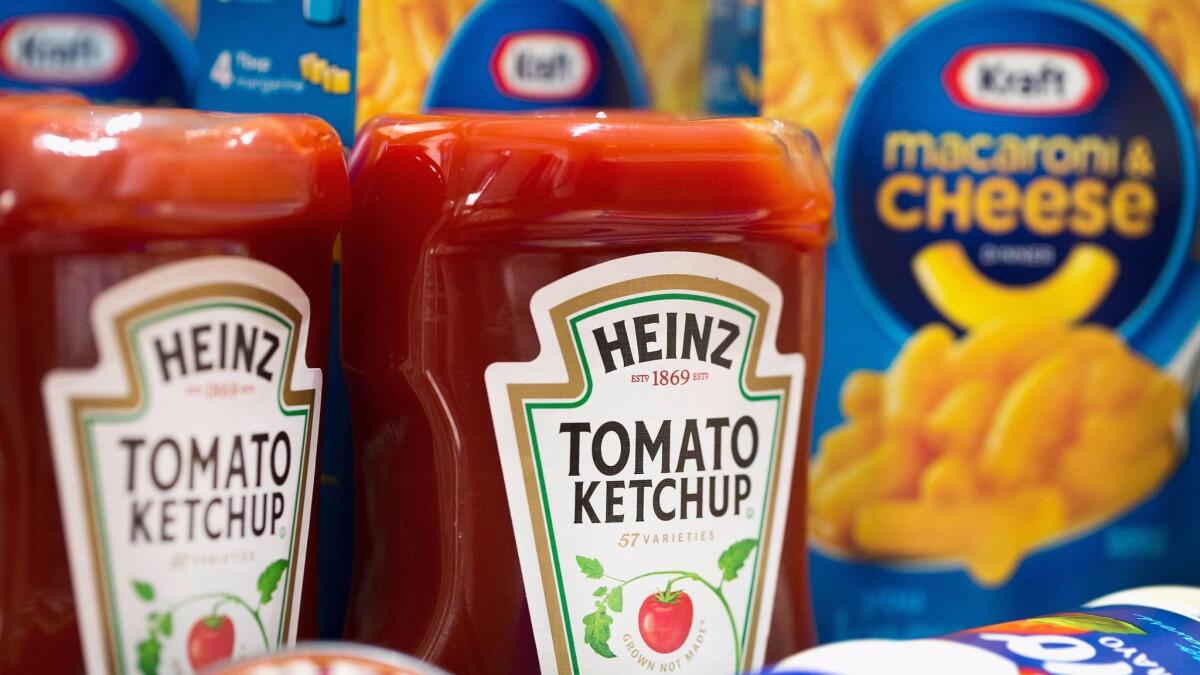Unilever rejected Kraft’s bid, but Kraft is still trying to buy it

Kraft Heinz Co. is trying to buy Unilever in a $143-billion deal that would join the U.S. maker of cheeses and lunch meats with the European producer of mayonnaise, teas and seasonings, creating a global powerhouse.
Unilever rejected the approach and called the price too low, but Kraft Heinz says it’s still interested in a deal. Shares of both companies surged to new highs as investors saw prospects for cost cutting.
A combination of Kraft Heinz, which sells Oscar Mayer meats, Jell-O pudding and Velveeta cheese, and Unilever, which owns brands including Hellmann’s, Lipton and Knorr, would rival Nestle as the world’s biggest packaged food-maker by sales.
That might not lead to big changes that customers would notice on the supermarket shelves. But it’s people’s changing tastes, shifting away from boxed and canned groceries in favor of items that seem fresher or healthier, that’s driving deal-making in the food industry.
Companies such as Kraft Heinz — itself formed from the combination of two century-old businesses in 2015 — are trying to find new avenues for growth amid heightened competition.
Part of the challenge is the proliferation of smaller food-makers marketing more wholesome products, which makes it harder for the established companies to drive up sales simply by selling more of their well-known products or by raising prices, as they have in the past.
“That obviously has its limits,” said David Garfield, head of the consumer products unit at consulting firm AlixPartners.
Instead, companies are having to dig deeper to find cost efficiencies or tap into new markets, Garfield said. That can include mergers that result in consolidated manufacturing systems, or that give companies access to distribution networks in regions of the world where they don’t have a big presence.
Those were some of the factors that drove Oreo and Chips Ahoy maker Mondelez International Inc. — which was split from Kraft in 2012 —to make an unsuccessful takeover bid for Hershey Co. last year. And they were among the reasons cited by executives in the Kraft-Heinz tie-up, which was engineered by Warren Buffett’s Berkshire Hathaway Inc. and by 3G Capital, the Brazilian investment firm with a history of taking over companies and aggressively cutting costs.
Bernardo Hees, a 3G partner, has slashed jobs and pursued other savings, some of them granular, as chief executive of Kraft Heinz. In a 2015 memo to employees, Hees reminded them to print on both sides of the paper, reuse office supplies such as binders and turn off computers before leaving the office to cut down on energy costs.
The company also stopped stocking the corporate office with free Kraft snacks.
Unilever follows Nestle, PepsiCo and Mondelez as the world’s biggest packaged food-maker by retail sales, coming in ahead of Kraft Heinz, according to Euromonitor International. In addition to its food products, it sells health and beauty products such as Axe body spray and Dove soap.
In the meantime, food and drinks companies such as Coca-Cola Co., General Mills Inc. and Kellogg Co. are also under pressure from Wall Street to slash costs and find products that suit the shifting customer preferences.
Although mega-deals are tough to pull off, they’ve made an array of acquisitions of smaller, faster-growing brands. Campbell Soup Co. is trying to shed its canned-food image, and it has bought juice and bagged-carrots maker Bolthouse. General Mills now owns Annie’s, Hormel Foods Corp. owns Applegate meats and Justin’s nut butters, and Dr Pepper Snapple Group Inc. recently bought Bai Brands, a maker of drinks that are marketed as rich in antioxidants.
Shares of Kraft Heinz climbed 10.7% to $96.65 on Friday. Unilever’s U.S.-listed shares jumped 14% to $48.53.
ALSO
Snap’s IPO builds an ‘impregnable fortress’ where only the founders have power
Zuckerberg’s goal: Remake a world Facebook helped create
New San Francisco cafe is funded by venture capital and staffed by robots
Big Pharma really, really doesn’t want you to know the true value of its drugs
UPDATES:
2:45 p.m.: This article was updated with closing prices.
11:45 a.m.: This article was updated throughout with additional details.
This article was originally published at 6:50 a.m.
More to Read
Inside the business of entertainment
The Wide Shot brings you news, analysis and insights on everything from streaming wars to production — and what it all means for the future.
You may occasionally receive promotional content from the Los Angeles Times.









